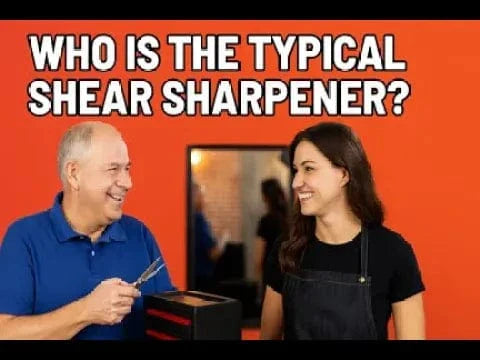
✂️ Who Gets into Shear Sharpening—and Why You Might Want to Join Us
I’ve been sharpening beauty shears since my early 30s—over 30 years now—and if there’s one thing I’ve learned, it’s this: the sharpening business attracts the most interesting people.
This week, I was working on a pair of student shears labeled “Dream Shears.” They didn’t cut tissue, not even close. I suspect someone had already tried to sharpen them—poorly. But as I honed the edge back to life with my trusty Scimech HD and diamond stone, I found myself thinking about all the people who find their way into this trade.
So Who Does Become a Shear Sharpener?
From my training classes and the folks I’ve mentored, the most common story is this:
A man over 55, retired from another profession, discovers sharpening through a stylist wife or girlfriend. Some come from technical backgrounds. Others, surprisingly, were in sales. The best financial success? Usually the ones who know how to talk to people.
But there’s no single mold. I’ve trained:
-
A guy who sold worm poop
-
A professional bass fisherman
-
A plumber
-
A jewelry salesperson
-
Musicians
-
An editor (who worked on my upcoming book!)
Younger sharpeners often come through family connections. My own son-in-law joined because, well, he married into it. For younger folks just starting out, I often suggest they train with someone outside the family first. Then, when they come back, you can sharpen each other’s skills.
What About Women?
We’re fewer, but we’re growing. I started off as a schoolteacher—definitely not the traditional route—but here I am, still loving it decades later. Women can do this work just as well as men. It’s about patience, hand skills, and a willingness to learn.
A Second Chance Business
Another quiet truth: Some sharpeners come from tough backgrounds, including prison. This trade offers something rare—a chance to work with your hands, own your time, and build trust with clients. I’ve met men who found a calling while incarcerated and turned their lives around through sharpening. If you’re willing to work and do it well, there’s room here.
Skills That Make a Difference
If you’ve got a background in anything hands-on—woodworking, metal, mechanics—you’ll probably take to sharpening quickly. But if you’ve got experience in sales? That’s the golden ticket. Talking to stylists, explaining the edge, demonstrating your value—those are what turn a sharpening stop into a repeat customer and a shear sale.
I sharpen mostly for stylists, not groomers. No offense to groomers, but I just enjoy working with hair stylists more. They’re creative, funny, and they know what they want. I like the back-and-forth.
Why Now Might Be the Right Time
Sharpening isn’t just a hobby—it’s a livelihood. If you’re a bit of a free spirit, don’t want to be tied to a desk, or want to build a business that fits your lifestyle, this trade might be calling your name. With the right tools and training (and yes, I offer both!), you can make a real income—on your schedule.
And if you're thinking, “I don’t know if I’m cut out for it”—well, neither did I. But here I am, thirty years in, sharpening shears that come in all messed up and sending them back smooth, sharp, and silent.
Want to Learn More?
If you’re curious about training, tools, or whether this might be a good fit for you or a family member, let’s connect. I offer both in-person and online training. My book (soon to be in print!) is also available as a downloadable PDF.
